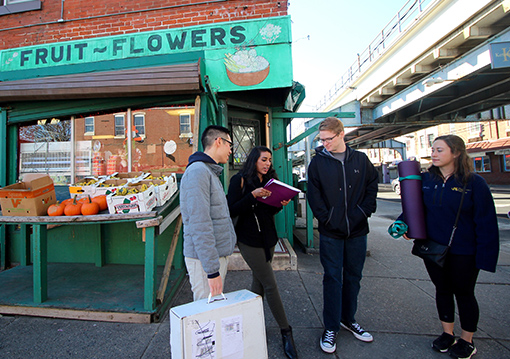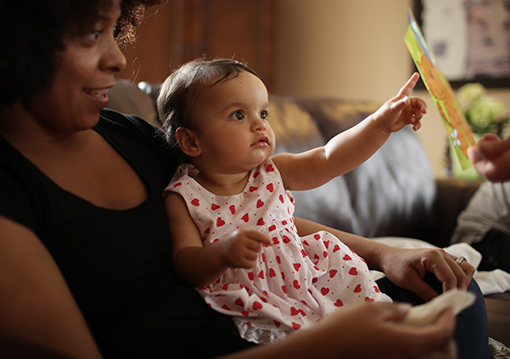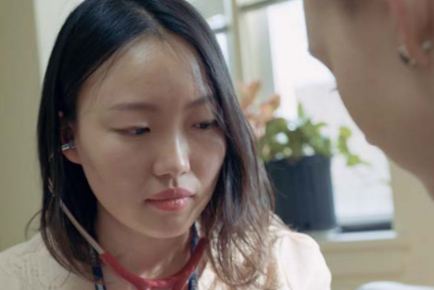A homeless man came into one of the Health Outreach Project clinics run by Drexel medical students. His fist was swollen because he had gotten into a fight. One of the first-year volunteers, Julianna Cervino, asked the man if he had put ice on his wrist to reduce the swelling. "Of course I haven't put ice on it," the man abruptly answered. "I don't have a freezer. I don't even have a bed."

Naloxone team members in Kensington
"That was a learning experience," says Cervino, now a second-year student and a project co-chair. "I should have known that a man without a home wouldn't have access to ice."
Now going on 25 years, the Health Outreach Project offers free health services to people in poor and socially vulnerable communities through five weekly clinics and a dozen other programs, while training a corps of future physicians committed to patient-centered, culturally sensitive practice. In 2018, more than 430 students provided health services to nearly 1,200 patients.
Students Steer
Supervised by faculty physicians volunteering on their own time, the clinics are located at special-needs adult day centers, transitional housing for people experiencing homelessness, a needle exchange site, and a residential rehabilitation program. Each clinic has a leadership team of medical student coordinators in charge of student and physician recruitment, pharmacy and supplies, and general steering.
The majority of the volunteers are first-year students who commit to serving at a clinic one day a week. Second- and third-year students also volunteer, serving as coordinators and as mentors for the first-years, who learn how to take a proper patient history, conduct a physical exam and present a patient to an attending physician, among other skills.

Programs for moms and children
Hands-On Learning
"Interacting with patients is so valuable for students," says Cervino. "You learn bedside manner, and it's a lot easier to remember what a patient presentation looks like when you see a real one instead of just reading about it.
"First-year students especially love coming to the clinics and speaking with patients, since most of the first year is spent in the classroom," Cervino continues. "Once when I went to our acute care clinic at the Salvation Army Residence in Roxborough, I listened to a patient's heart murmur. I had never before listened to a real heart murmur with a real stethoscope in a real chest — I had only done it in simulations. It was a great learning experience."
Students who volunteer at the Salvation Army clinic are working with adults in a substance use disorder rehabilitation center. They learn how to treat acute care issues as well as chronic conditions such as pain and hypertension. They can also train to be smoking cessation counselors for a program held at the center.
"The students really get to know the patients who live there," Cervino says. "They see many of the same patients every week and can follow their progress."

Drexel med student taking vitals
At the Eliza Shirley Shelter for mothers and their children, students help to provide acute care services and run programs they have developed themselves, like Jump Into Reading for the children and a workout class called Move It With Mommy and Me. The volunteers are also involved in smoking cessation and special seminars on women's reproductive health and sexually transmitted infections.
The Arc of Philadelphia, a day center for adults with intellectual disabilities, gives students valuable experience with a patient population that they don't often see, according to Cervino. In weekly wellness clinics, some time is spent just teaching patients how to communicate about their health.
In talking to one man, student volunteers realized that he had never been to a dentist, Cervino recalls. "We talked to him about why he was afraid to go, encouraged him to make an appointment and wrote a letter about it to his mother, who was his caregiver. A few weeks later, his mom called and she was so grateful — her son had gone to the dentist for the first time in 30 years. She said that he probably never would have gone if we hadn't taken the time to talk to him and address his fears. That was very rewarding."
Bringing a Sense of Stability
Student volunteers bring added support to the residents of St. Raymond's House in Philadelphia, which provides permanent supportive housing for adults with chronic health conditions. "Our residents haven't had stability for years, and because of that, they haven't been taking care of their health," says Brandon Doll, St. Raymond's senior program counselor.
Every Thursday night, students run a wellness clinic at St. Raymond's, where they help residents monitor blood pressures and blood sugars, set health goals, make medical appointments and better manage their health problems.
"One of the struggles in my job is getting people to keep their medical appointments," explains Doll. "The students help them set up appointments and help to make sure that they follow through and go to the appointments. I'm so thankful for their help with this. The residents can tell that the students really care about them.
"One resident in particular was neglecting his health because he loves to work and was focusing only on his job," notes Doll. "He doesn't understand that if he doesn't take care of his physical and mental health, he's not going to be able to keep his job. The students are really helping him to see this connection."
During visits with the residents, the students cover things that might be pretty basic to most people, such as the importance of taking their medication every day, according to Doll. "I once had a resident with diabetes ask, ‘Do I need to check my blood sugar after I drink a glass of water?' That's where the Drexel medical students are really helpful. They are very patient in explaining why and how residents need to manage their health."
Preventing Overdoses
Students see a very different patient population at the Streetside Clinic in Kensington, which is run out of Prevention Point, a nonprofit organization that provides harm reduction services, including HIV/HCV testing and a needle exchange program. Streetside provides acute care services to those experiencing homelessness, sex workers and people with substance use disorders. "We see a lot of abscesses and infections at this clinic," notes Cervino.
Stemming from their work at Streetside, the separate Naloxone Outreach Project is the students' pivotal opioid overdose reversal and education initiative. Drexel medical students go out into the Kensington community to gas stations, corner stores and churches, asking business owners or church staff whether they've ever had someone overdose in their restrooms and if they would be interested in learning how to administer naloxone. If so, the students teach them how to use it and give them a supply. So far, students have distributed more than 160 doses of naloxone and are credited with saving 29 lives. (For a deeper dive into this program in action, see "Of Hippocratic Oaths and Antidotes" at drexelmagazine.org/2018/of-hippocratic-oaths-and-antidotes/.)
As word has spread, the Drexel students have given overdose reversal training to students at Penn, PCOM, Temple, Jefferson and Cooper Medical School in Camden. These trainings emphasize harm reduction (teaching people who are using opioids to avoid overdose) and destigmatizing addiction. Now, thanks to an endowed fund honoring the late Carl Norden, MD, the students can also carry the message to conferences such as the Society for Student-Run Clinics, where they are presenting a workshop, "Harm Reduction & the Opioid Epidemic: Impacts & Lessons Learned From a StudentLed Initiative."
Wellness and Prevention
In addition to the clinics, the Health Outreach Project has numerous other programs that run on a regular basis. Among them are DrexelCARES, a new street medicine team of students who are trained to engage people experiencing homelessness with respect and dignity while distributing care packages of toiletries, socks and other personal necessities along with educational pamphlets.
In ongoing activities, the medical students produce a quarterly health fair for Philadelphia's refugee population, provide screening for hepatitis C through "C a Difference," and give stress reduction classes that include mindfulness, meditation and yoga.
All of the medical student volunteers receive extensive training, which includes sensitivity and health advocacy training for the populations they serve. Students better understand the profound impact of social conditions such as poverty, discrimination and poor access to health care on the lives of patients. "They are taught the proper language to use and questions to ask patients," says Cervino. "We always want our patients to feel comfortable coming to us, so we need to be sensitive to their situations in life."
Steven Rosenzweig, MD, director of the Office of Community Experience, concurs: "It's hard to overstate the value for students of participating in the Health Outreach Project. They learn so much about members of our community who are socially vulnerable yet incredibly resilient. They get to cultivate empathy, compassion, and connection with people who have such different life stories. They get to show up for patients, not as authorities or experts, but as health advocates, meeting folks where they're at. All this while engaging with peers and faculty to integrate learning about medicine with the realities of social conditions that impact health."